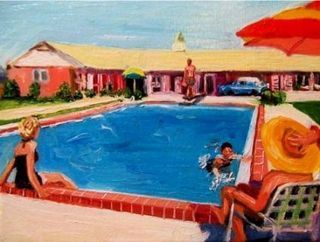Nancy Martin's Blog, page 18
July 15, 2011
Kathy Miller Haines Guest Blogs
We have Harry Potter to thank for getting kids to read again. But terrific YA authors keep young readers returning to libraries for more books. And parents have started picking up YA titles--first, perhaps to check what kids are reading, but more and more because the stories make for great reading. Please give a TLC welcome to Kathryn Miller Haines, who may write young adult books now, but her heart is . . . smutty. In a nice way, of course.
The Girl is Murder, my first YA mystery, comes out on Tuesday (woot!) In preparation for the release, I've been doing interviews, where I'm inevitably asked, "what were your favorite books when you were growing up?"
Here's what they want to hear: Nancy Drew. Great hook after all, right? Girl wowed by girl detective grows up to write books featuring a new girl detective. And it's true that I read and enjoyed Nancy Drew, along with lots of books by other writers like Judy Blume, Katherine Patterson, Francine Pascal, and Lois Duncan. But I'm going to tell you a secret: by the time I hit my teens, what I wanted and what I sought out was smut, plain and simple.
Please keep in mind, I mean smut in the nicest way possible. These books took talent to write: complicated plots, detailed genealogies, research into estate law, blood diamonds, and the British military during World War II. But what drew me to people like Sidney Sheldon and that Grande Dame of the lurid, V.C. Andrews, wasn't the careful plotting, but murder, incest, rape, and romance where the screen didn't fade to black at the first kiss, but instead the camera lingered on all the naughty details (Nipples! Quivering! Throbbing manhood!)
[Aside: have you seen Game of Thrones? We just finished a marathon of season one and I kept thinking this is medieval V.C. Andrews sprinkled with some fantasy elements.]
I loved the complicated, dye-cut covers where everything appeared wholesome on the outside, but on the inside, when the outer cover was lifted and the stepback revealed, the beautiful heroine was in jeopardy, her physical position a little too intimate toward her equally attractive brother, her innocent face tacked onto a surprisingly come-hither body with measurements Barbie would've envied. And the names of those innocent, yet alluring, women! Dawn, Melody, Ruby, Heaven (and, of course, Cathy – how lucky was I to have my own name among this cavalcade of strip club headliners?)
I wish I knew what drew me to these stories. Certainly not the siren call of feminism. These were all women abused in some fashion, often by the men in their lives, whose attempts to rise through the ranks were continually thwarted by a Dark Secret in Their Past (often one that occurred in the generations before, but which continues to Haunt Them to This Day). No one had happy endings, not really. The good died way too young and tragically (car accidents, arsenic poisoning, childbirth), the bad were eventually defeated but their crimes lingered and continued to hurt those who survived. And our heroines were often forced to do unforgiveable things, marring their own morality for the next generation to be marked by.
I suppose it was adolescent sexual curiosity mixed with a desire to escape my secure, middle-American existence that made me want read about these things. And I had an endless supply of them, thanks to an older sister who left a trail of mass market paperbacks from her bedroom, to the lawn chair where she spent her summer afternoons baking beneath a glaze of coconut-scented Coppertone lotion.
For years, I thought I was alone in my love of these books, so it was a great relief to discover a few years ago that I was in fact one of thousands (millions?) of young women who dog-eared copies of these books or were warned against them by parents who knew what dwelled between their covers. I wasn't a pervert, I was part of the cultural zeitgeist!
So what about you? What forbidden books found their way onto your bedside tables during your formidable years?
Kathryn Miller Haines is an actor, an award-winning playwright and the author of the Rosie Winter mystery series. BookList gave The Girl is Murder a starred review, saying, it's "a smart offering that gives both mysteries and historical fiction a good name." Read an excerpt here.
July 14, 2011
How to be your Father
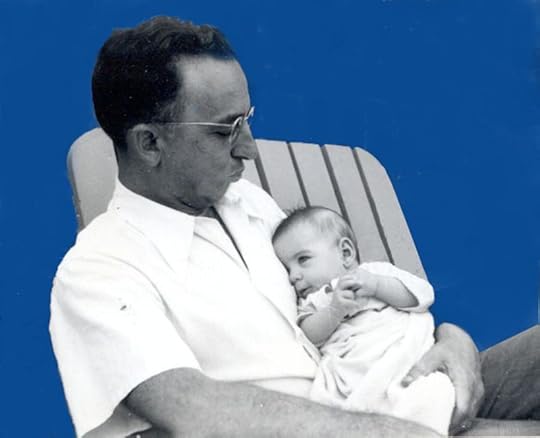 The other day I was organizing my office closet and stumbled across the following, written in my handwriting:
The other day I was organizing my office closet and stumbled across the following, written in my handwriting:
How to be Dad
-sing bless this house everywhere you go
-pray the rosary with mom
-dress up in crazy costumes as often as possible
-knock yourself out to make xmas special
-say your favorite phrase over and over, ad nauseum. but mean every word.
I stared at this sheet of paper for a long time before I realized what it was. When I moved to North Carolina six years ago, I was between novel contracts and had some rare spare time on my hands, so I decided to work on the memoir I'd long wanted to write. Not knowing where to begin, I bought a book called Your Life as Story by Tristine Rainer. This is one of my absolute favorite How-To books, not only for a memoir writer but for a novelist as well, because it delves into how to structure a book in a way that captivates and keeps the reader reading. I had a couple of months to play with my memoir, doing many of the exercises in the book designed to help me remember the events and people and emotions of my life. Then I got another contract (thank God) and set the memoir aside.
So here in front of me was one of Tristine's exercises: In order to paint a portrait of a "character" in the memoir, ask yourself 'how to be' that person. Try this exercise with one of your parents or a sibling or another important person in your life. You'll get something different than if you just try to describe that person. I can almost guarantee that you'll tap into deeper emotions.
My dad died ten years ago at the age of 90. He often walked around our house singing Bless this house, oh lord we pray, in a resonant bass. But he was a school principal, and I heard from a friend who taught at his school that he also walked through the halls of his school singing this song. (I don't think this would fly in public school in 2011!). I could just picture this gentle man, so comfortable in the school he loved, filling the halls with his song.
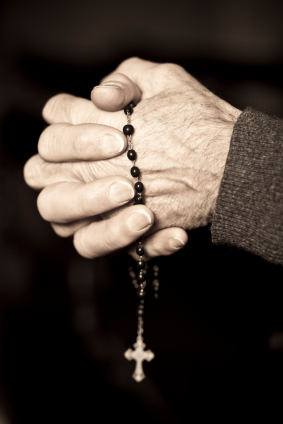 At night, I'd hear him and my mother praying the rosary together in their bedroom, but despite his religiosity (he attended mass every morning), he and my mother were playful and actually a little randy, putting on risque skits at social events and taking any opportunity to play dress up.
At night, I'd hear him and my mother praying the rosary together in their bedroom, but despite his religiosity (he attended mass every morning), he and my mother were playful and actually a little randy, putting on risque skits at social events and taking any opportunity to play dress up. 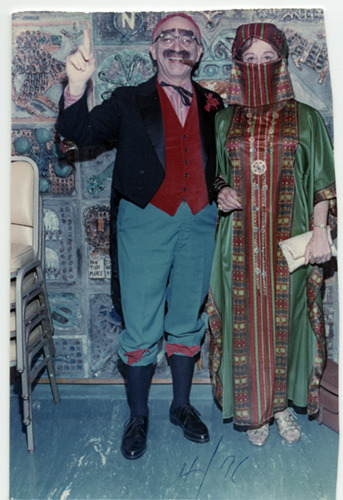 With four kids, we didn't have much money but he always made sure there were tons of gifts under the tree on Christmas morning, because he'd shop the sales late at night on Christmas Eve.
With four kids, we didn't have much money but he always made sure there were tons of gifts under the tree on Christmas morning, because he'd shop the sales late at night on Christmas Eve.
His favorite saying was "true happiness comes from helping others," and he said it so often that our eye-rolling muscles got plenty of exercise. But really, he was right wasn't he? And wasn't he the guy who gave me that book, So You Want to be a Social Worker when I was a kid, guiding me into my pre-novelist, "helping others" profession?
Give it a try. Pick someone important from your life and ask yourself how to be that person. You just might learn something about yourself in the process. And you'll get a teeny little part of your memoir written while you're at it!
July 13, 2011
Seeing the USA, in our Chevrolet
By Nancy Pickard
Take one '49 Chevy--a green two-door sedan. Place a mom and a dad in the front seat, and their only child--a girl-- in the back seat. 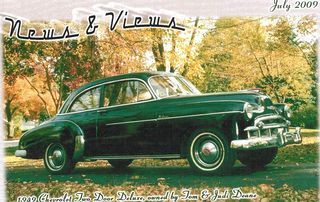 Don't forget the thermos of water and a sack of snacks--crackers, cheese, grapes, mostly. Now you've got a picture of two weeks of my summers from the time I was five to when I was twelve. Oh, and add in a cross country car ride in a different direction every year. By the time I hit that twelve-year-old marker, I'd been in every state in the lower 48 but one. Rhode Island, I think. Sorry, R.I., but you must have been off our beaten track that year.
Don't forget the thermos of water and a sack of snacks--crackers, cheese, grapes, mostly. Now you've got a picture of two weeks of my summers from the time I was five to when I was twelve. Oh, and add in a cross country car ride in a different direction every year. By the time I hit that twelve-year-old marker, I'd been in every state in the lower 48 but one. Rhode Island, I think. Sorry, R.I., but you must have been off our beaten track that year.
My mom, an elementary school teacher with the summer off, planned everything, chose our destination, and then woke up my dad and me very early to to get going and beat the heat. By 3:30 or 4 on the first morning, I'd be already falling off to sleep in the back seat, and by the time we stopped for breakfast in one of those mom and pop places that used to dot highways, the sun was up and we were already a couple of hundred miles across Kansas on a two-lane highway before the days of interstates. This would be in August. Without air conditioning. What was that like, you young'ns ask? Mostly, we didn't notice, because we didn't know any different, but now and then it was pretty miserable, to tell you the unsentimental truth. Sweating. Too hot to talk. Hot breeze surging in through every window we could open. (Cars used to have "side vent" windows you could use to direct the breeze anywhere you wanted it to go. They were wonderful! If I could bring back anything from those old cars, I'd bring them back. Trust me, you'd love them.) I remember putting a blanket over my head, in spite of the heat, just to block out the sun.
But boy, it made the swimming pool at the motel at the end of the day feel so very sweet. You haven't truly enjoyed a dip in a pool until it follows twelve hours in the back seat of a car where it's a hundred sweltering degrees.
The motels were cheap. Plain and cheap. We found them by following the AAA book religiously. My mom would go into the motel office, AAA book in hand, and then we'd watch her follow the motel owner down the long line of units so she could examine our room. She wasn't hesitant to say, "no," if it wasn't clean. It was an exciting moment when we saw her wave for my dad to pull into the parking slot in front of that room.
A motel with a swimming pool cost a few dollars more. Lucky for me. my parents were willing to splurge on the extra three bucks at the end of our long travel days. They'd take turns sitting by the side of the pool listening to me shout, "Watch me!" before I jumped off the low dive.
We'd eat dinner at another mom 'n' pop cafe.
Every few days, I'd get cherry pie. Homemade.
On those trips, when my mom was doing the driving, my dad and I used to play a game he invented. He'd been a bit of a musician before I knew him: played the banjo and the piano and sang in a sweet tenor. In the car, he'd tap out the rhythm of a popular song with his finger tips, doing it on the back of the front seat so I could hear it. Then I'd have to guess the song just from those taps. Then I'd do the same, and he'd have to guess. We could pass a lot of time tapping out "How much is that Doggy In the Window," or whatever was popular that year.
Those were the days before seat belts, so I could stretch out to sleep in the back seat, or lean over the front seats to be closer to my parents, or even crawl up into the level place below the rear window and lie there, like a puppy, when I was small enough to fit. My god, the National Transportation Safety Board would have a conniption fit if they saw that now. It's better now. I guess. Kids are safer. But a lot less comfortable. Sometimes I feel sorry for kids now, for being so contained, so strapped in, so safe.
On those trips we saw California and we saw Maine, we hit the beach in Florida and we took a ferry to Vancouver. I ate pancakes with fresh blueberries on the east coast and fresh trout in the Rockies and lots of chicken fried steak.
Wouldn't you know that although I truly loved those trips, I envied my friends who got to go to the same cabin in the Ozarks every summer. They, it turned out, envied me for the confidence I gained from getting to venture outside Kansas City.
It wasn't all great. There was that no air conditioning thing. There was the flat tire in the Utah desert, and the bear who climbed onto our picnic table and ate our lunch in Yellowstone Park, and the ratty motel in Reno, and my mom's once-a-trip-migraines, and my car sickness on curvy roads and behind Grayhound buses, and how there wasn't much money so there were no souvenirs to bring home. And if I never see another state Capitol it will be too soon. But if it wasn't all great, it was mostly great, and I'm really grateful to my mom for insisting we do it, and to my dad for giving up his entire two weeks of vacation so we could. It wasn't until years later that I realized that meant he never had ANY vacation days in the whole year--in a long lines of years-- just to relax and putter around home. 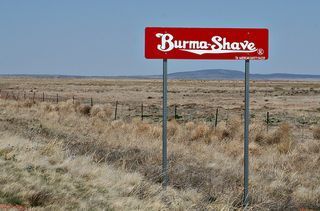
I've loved the feel of wheels rolling under me ever since, and I still love hotels, so thanks Mom and Dad. Thanks for the car, the cool water, the a la mode on the pie, the cots I slept on, the games, the swimming, the opening of my eyes to a bigger land.
What about you?
Did you have travel vacations where every night you stayed somewhere new? Or did you always go somewhere and stay there for the whole time? Maybe you stayed at home, and never got a special vacation at all? And what about your kids? What will they tell people, years from now, about their summer vacations?
July 12, 2011
World-changing Gadgets
Margaret Maron
 Flipping channels the other night, I landed on the History Channel when they were airing "101 Gadgets That Changed the World." I came in on #12 (the typewriter) and #11 (transistor radio), so I have no idea what the first 90 were, but I was muttering, "No, no, no!" to most of the last 10. Here they are:
Flipping channels the other night, I landed on the History Channel when they were airing "101 Gadgets That Changed the World." I came in on #12 (the typewriter) and #11 (transistor radio), so I have no idea what the first 90 were, but I was muttering, "No, no, no!" to most of the last 10. Here they are:
#9 – alarm clock
#8 – phonograph
#7 – rotary telephones
#6 – unit air conditioners
#5 – personal computers & the Internet
#4 – hypodermic syringe
#3 - television
#2 – radio
#1 – Smart phone
Are they serious?
The light bulb definitely deserves a place in the top ten, but the others?
Okay, air conditioning units may have made the South more livable, but "changed the whole world"? Get real. And yes, rotary telephones put a lot of operators out of business, and the alarm clock helped get people out of bed in the morning, but world-changing? I don't think so. Surely the telegraph changed more than the telephone ever did.
The Gutenberg press still deserves a place in the top ten. It really did change the whole world, not just our little part of it. Ditto the personal automobile, which killed the trains, allowed people to live miles from their work, and is responsible for so much of the earth's surface being paved over. It also changed the balance of power for the Middle East by its dependence on oil.
Why isn't the airplane in the top ten? Didn't it shrink the world and make it possible to bomb your enemies back to the stone age without ever seeing their faces? And what about the microchip? If you listed it in the top ten, you could mark off computers and the Smart phone.
 Yes, the latter affects the way we communicate, but it wasn't that huge a change from regular phones. Merely faster. And without the microchip it would be the size of a refrigerator. (And where is the refrigerator, by the way?)
Yes, the latter affects the way we communicate, but it wasn't that huge a change from regular phones. Merely faster. And without the microchip it would be the size of a refrigerator. (And where is the refrigerator, by the way?)
The hypodermic could actually change the world by eradicating so many  diseases that stem from poverty and ignorance, but only if rich nations help bring the needles and the chemistry to the poorer ones. So far, it doesn't seem that much of a world-changer to me.
diseases that stem from poverty and ignorance, but only if rich nations help bring the needles and the chemistry to the poorer ones. So far, it doesn't seem that much of a world-changer to me.
Where's the photovoltaic cell? Doesn't it have potential to change the world by lessening the importance of fossil fuels? You can bet that a bunch of high-living, dictatorial emirs would consider it world-changing if we ever get serious about developing it on a large scale.
What else should go in the top ten? Handguns? Tractors? Squirrel-proof bird feeders?
Or hasn't your world-changing gadget been invented yet?
July 11, 2011
Health Care Madness: Tips to keep you sane
Health Care Madness: Tips to keep you sane
By Kathy Reschini Sweeney
Don't let anyone tell you otherwise: our health care system is a damn mess. I am not holding my breath for any injection of sanity or brains in the near future, either. So today we are going to share tips on how to navigate in this Crazytown.
1. You MUST have an Advocate. If you have Chuck Norris or Oprah on speed dial, by all means, ring them up. Otherwise, just find a human who can listen and take notes. No matter who you are, if you are the one getting treatment, you simply cannot keep track of everything yourself. This is because, among other things, you will be distracted by either the weird-ass stuff in the doctor's office ("Wonder where they put THAT thing?") or the medical staff themselves. For example, I have never, in my life, seen any group do more snacking than nurses. I swear someone had a belgian waffle maker in the pre-op area last week.
2. You MUST coordinate your own care. Remember how computerized records were going to provide such efficiency and improve the quality of patient care? BWAH! Some fool assumed that people were actually going to read the damn things before they engaged the patient. How quaint. Never assume that the doctor/nurse/intern/janitor who is treating you knows anything about you or your condition. We were in an - allegedly - top-ranked trauma center where they kept insisting that the left elbow was broken, when in fact anyone who can tell a triangle from a car wreck could plainly see it was the right elbow.
3. You MUST ask questions and be pro-active. Unless, of course, you prefer spending hours at a time sitting in a waiting room or a hospital bed. Don't think that anyone will remember you are there or that you were supposed to get meds/fed/blood/surgery. Whether hospitals are understaffed or just unorganized, you need to be the one who makes sure things happen. I suggest having your advocate watch the hospital scene from "Terms of Endearment" as a training film.
A word about waiting rooms - don't bother watching Jerry Springer on the TV. There is much more interesting shit going on around you. Whoa. Which reminds me - you must carry Purell or your choice of bleach at all times. Fight the urge to use it on your eyes - once seen, some images simply cannot be erased.
4. You MUST keep your own records - which is another reason you need an advocate. It does not matter how many times you answer the question: "Are you allergic to latex?" There is a law that every person you encounter in a health care setting must ask you the same freaking questions every time they see you even if they just asked five seconds ago. Don't fight it. If you must, make flash cards and just show the answers.
5. Do NOT assume that bigger is better. No joke here. I never thought I would say this, but there are advantages to local hospitals. They may not have the cutting edge technology or the fancy speaking engagement resumes of the mammoth systems, but they do have people who actually learn your name, rather than just checking the number on your bracelet. I am convinced that nurses and other hospital staff at these big places take classes from bartenders on how to avoid eye contact.
6. Do NOT sign everything just because someone tells you to. I know this is a pain in the ass, but you actually have to read some of this crap. Otherwise, you could find yourself consenting to all kinds of bizarre treatment. Stick up for yourself. If you don't want a cast of thousands in the room every time you have to go to the bathroom, say so. (This applies mostly to those who have never given birth - because once you go through that show, you lose all sense of modesty. I mean, I delivered my kids at a teaching hospital, and by the time it was over, I could have been a trending buzzfeed viral video and could not have cared less.)
One final note - try really hard not to go to the hospital in July. Everyone knows that's when the new baby docs hit the halls. Unless you are young, single, and looking for a mate who won't be home for long stretches at a time, avoid these newbies at all costs.
Also - and I mean this in the most loving way possible - my strong suggestion is that each of you do some Kevorkian reading. I know I am. Because no way am I spending my last days on earth in a hospital. NFW. No offense to the wonderful health care providers out there, but if I am going to have to spend time in hell, I'd prefer to do it after I'm dead, not while I'm waiting. Just saying.
Your turn - what advice can you share about surviving our medical system?
July 10, 2011
A Small World, or Bob's Your Uncle
by Heather
 Once upon a time, Florida had a governor named Bob Graham. My name is Graham, so that is rather cool. Now, I knew we weren't related--my dad and his family just came from Scotland while the Graham family that the Governor came from had been in the country--even in the South Florida area--for decades. But I really liked Governor Graham.
Once upon a time, Florida had a governor named Bob Graham. My name is Graham, so that is rather cool. Now, I knew we weren't related--my dad and his family just came from Scotland while the Graham family that the Governor came from had been in the country--even in the South Florida area--for decades. But I really liked Governor Graham.
He was decisive. And my favorite stance he took was when the then-governor of 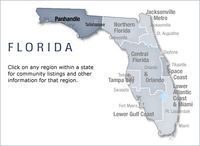 Alabama wanted the Florida panhandle. Now sometimes it's true that the Florida panhandle is called South Alabama. And that's okay. We like our neighbors and it's delightful that Louisiana and Alabama friends come to the panhandle beaches.
Alabama wanted the Florida panhandle. Now sometimes it's true that the Florida panhandle is called South Alabama. And that's okay. We like our neighbors and it's delightful that Louisiana and Alabama friends come to the panhandle beaches.
But it's our panhandle. To me, Florida is the amazing, quirky state that it is because we have areas that are so vastly different. The north of the state is Deep South, St. Augustine is the oldest city continually inhabited by European settlers in the  U.S., the center of the state is theme-park-ville and the south of the state has become completely international; Spanish is the dominant language, while you'll hear Brazilians who hail largely from mother Portugal, Slavic languages--we have a nice population of Russians--and the occasional German, French, and Italian.
U.S., the center of the state is theme-park-ville and the south of the state has become completely international; Spanish is the dominant language, while you'll hear Brazilians who hail largely from mother Portugal, Slavic languages--we have a nice population of Russians--and the occasional German, French, and Italian.
We have the Keys, where you enter another world, and you have the west coast, and the magic of Sarasota and the Ringling mansion and so much more.
To get back to the point, it was rather an incident. The governor of Alabama really
wanted to panhandle. And Bob Graham was fierce in defending it.
We in Florida 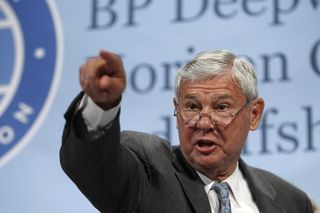
came together--no one is getting our panhandle!
So, to try to make a long story a bit shorter, I really liked this man, though I didn't know him. I thought he was great for my state, and I love my state. He went on to serve longer in politics.
When I would go to a restaurant, I never lied. But when people asked me if I was related I would try to pretend that I just didn't want to say so, or use our affiliation. I always got seated quickly, and people were so nice!
As I write this, I'm getting ready to leave Thrillerfest, an amazing experience all on its own. I got to "date" Harley Jane Kozak at the banquet where she was up for an award. I posed with R.L. Stein, Jon Land, and F. Paul Wilson with a smart car for Reading is Fundamental.
 And I met Bob Graham. Yes, my favorite governor has now written a thriller. So, T-fest was a real thrill--Bob and I now have a picture together, and we have decided that surely, somehow, we are cousins!
And I met Bob Graham. Yes, my favorite governor has now written a thriller. So, T-fest was a real thrill--Bob and I now have a picture together, and we have decided that surely, somehow, we are cousins!
And what about you? Ever meet a stranger who shares your last name? And did you claim them or disown them?
July 9, 2011
10,000 and Counting
By Elaine Viets

This was the Joplin High School library until 5:41 p.m. on May 22.

Here's what it looked like Wednesday, 45 days after the worst tornado in 60 years ripped through Joplin. The twister tore a path six miles long and a mile wide through this southwest Missouri town of 50,000 people.
This is a small glimpse at what Joplin lost: 8,000 thousand homes.18,000 cars. 450 businesses. 159 lives.
My friend Deb Marshall took that photo of the ruined high school. She's president of the Missouri Writers' Guild. The MWG, along with the St. Louis Writers' Guild, has collected 10,000 books for the city's school libraries. Deb organized the book collection from St. Louis, nearly 300 miles away on the other side of the state.
"Providing books to the schools' libraries is a step toward rebuilding the entire Joplin community," she said. Deb says the schools are struggling to open on their "originally scheduled date of August 17. The books are a small way we can help them return to normal life after this catastrophe.
"You wouldn't believe the devastation in Joplin," she said. "The media is correct; pictures can't begin to tell the story. Although I am a journalist with a 'need to know,' I felt like a trespasser on hallowed ground."
Deb wasn't trespassing. She was delivering books at MWG's expense. She got the word out at the cost of her time. Deb is a writer, and should be working on her own book.
Wounded Joplin is serious about rebuilding, and Americans are pitching in.
"I am receiving books from all over the country," Deb said "I got an e-mail from a Catholic middle school librarian in Muskegon, Michigan, who's from Missouri and consolidating two libraries due to school closings. Would we like books and library furniture?"
MWG is delivering that.
"Someone in Chicago sent 700 books for the high school." Another company donated $5,000 worth of ebooks.
"To say I'm grateful for the response is an understatement," Deb said.
None of the MWG's Joplin members were hurt. One woman, Ann, has a "home in splinters." But she'd not wasting time feeling sorry for herself. She's on the board of George A. Spiva Center for the Arts, the "beautiful art center and gallery in downtown Joplin. Ann has visions of readings and cocktail party book launches at the gallery. She was excited to show me their new gallery and introduced me to everyone there, including artist-in-residence Sam Lewis, who is also an elementary art teacher." Deb said Sam lost "an extensive library that included some valuable art books."
Joplin is mourning its losses – but making plans to rebuild. Many TLC regulars have already helped. I'm asking you for more.
"The Joplin School District libraries still need books," Deb said, "especially since books in an additional elementary school library were unable to be saved due to asbestos contamination. Books are needed for libraries in two elementary schools, a middle school and the high school. The district's Teacher Resource Center was destroyed. Head Librarian Debbie Heim said DVDs are also needed.
"Books and teacher resource materials may be sent directly to Joplin. Ship them to:
"Debbie Heim/Library
"MWG Joplin Book Drive, Memorial Education Center, 310 West 8th St., Joplin, MO. 64801."
Don't want to pack and ship books? Not sure what to send?
"Cash donations to the Missouri Writers' Guild Joplin Book Drive or gift cards for books to Deb Marshall, President, Missouri Writers' Guild, 1203 Spartina Drive, Florissant, MO 63031. MWG is a 501(c)3 organization. All contributions go directly to the Joplin School District Libraries for books and learning resources."
Even $5 can buy a little hope.
July 8, 2011
He Must Have Saved a Bundle on All Those Shirts
He Must Have Saved a Bundle on All Those Shirts
By Brunonia Barry
Inspired by Nancy Pickard's recent post on long-term relationships and a comment Elaine made about a conversation at a wedding last weekend, I decided to write about the ideal man.
I've spent a lot of time lately writing about him. I'm not talking about the man you're married to or the old boyfriend you've recently friended on Facebook, I'm talking about the fantasy man, the fairy tale hero. The Map of True Places was all about that man. A real fairy tale (with its requisite hero) was embedded into the middle of the book, written by a female character who found it impossible to create a happy ending to finish her story. There was a good reason for her failure. From her own experience, she realized that these men and the happily ever afters they promise don't exist.
Perfect men exist only in fiction or in our imaginations, and there are very good psychological reasons they should stay there, but I won't go into those now. Suffice it so say that if you think you meet one of these fairy tale men on the street, you should run for your life. Just as Barbie doesn't exist, neither does a real life Prince Charming.
And what if he did? I, for one, couldn't deal with that kind of perfection, because it would undoubtedly require perfection in return, something that isn't going to happen for me in this lifetime. But think about it. If you had the perfect man, how long would the relationship last before you grew bored? Give me a man with a few human flaws, and at least I can try to fix him. But that's a post for another day.
Today, I don't want to talk about real men, I want to talk about our fantasies. While writing The Map of True Places, I challenged myself to come up with a fairy tale hero who would suit a modern woman's jaded sensibilities. Now, you may think that's an easy task, but I'm telling you, it's not. Make him too nice and he's sickening, too handsome and he's competing, too tough and he's threatening. So how do you create the right balance, something that works for (almost) everybody?
Let me describe the character I created. His name is Hawk. He's a rigger on a tall ship and works on the side as a carpenter. He has an advanced science degree, but works with his hands. He is sensitive and poetic, but he is not above hurting someone, if necessary, to protect you. Oh yeah, and did I mention that he looks like George Clooney?
Now, I'm not a writer who usually describes the physical attributes of my characters. I might write that someone has red hair or a limp, but I leave most of the creative character descriptions to the minds of my readers (which leads to some great arguments at book clubs). So it was odd for me to describe my modern fairy tale hero in my latest book, but it was absolutely necessary to the story. And hey, who doesn't like George Clooney?
Hawk might not be your perfect man, but he was perfect for my novel. Still, creating him was quite a challenge. It has been several decades since I made a list of the attributes of my personal Prince Charming.
The last time I did, I was 29 years old and working at a Hollywood studio with several other single girls who were all suffering through varying degrees of dating anxiety. One day, in the name of creatively visualizing what we wanted in order to manifest it, we decided to write down those preferences and hang them on the bulletin board where we could see them every day.
We thought it would take the afternoon (it was a slow day at the Studio), but the rule was that we all had to agree on each of the qualities, or they wouldn't make the list. It didn't take us a day. It took us almost a month. Here are the ten qualities of the perfect man written in 1979 by women who ranged in age from twenty-four to twenty-nine:
Six feet tall or greater.
At least a year older than me.
Looks directly at me when he talks.
Must have money
Or at least a job.
Educated
But not necessarily working in his chosen field, maybe does carpentry on the side. Preferably without a shirt.
Looks good without a shirt.
Likes foreign movies
doesn't complain about subtitles
doesn't watch porn
Reads poetry, but not too much.
Handsome but not pretty.
Owns a car. (Note: this should be a subset of #4, but many of us had moved to LA from New York, and so had the men we were dating. Some of them didn't even have driver's licenses.)
GREAT in bed.
We all agreed that this last quality was by far the most important and probably should have topped the list, but we were writing with a permanent calligraphy pen, and there was no revising.
When I recently showed the list to my husband, his only comment was: "Of course the guy had money, he obviously saved a bundle on all those shirts he didn't have to buy."
Every one of my friends from the studio has married since, some more than once. I'm sure their new lists would look very different.
So tell me, what would you put on your list today? Has it changed over the years? Is there one characteristic that you always longed for in a partner and didn't get? And guys, feel free to create your fantasy woman. Today, everyone has a free pass to ask for anything. No judgments allowed.
Ian and the Blue Gill
by Barbara O'Neal
Three women, ranging in age from senior to ancient, are settled in a half circle at the end of the dock. The chairs have been dragged down to the pond from the main house, metal lawn chairs with green and white woven seats. My young son and I sit on the wooden slats of the dock. A little while ago, there were some bigger boys, young teenagers in baggy shorts and skinny chests, daring each other to swim in the murky water with snapping turtles and water snakes, but they're gone now.
The old women wear cotton skirts and sensible shoes and soft cotton hats to protect their good complexions. Gnarled fingers fix bait. Fishing lines trail lazily in the water of the small pond. The air 
is thick and still, so hot I find it hard to breathe, and my son's pale cheeks are flushed. We are Colorado natives, and this is the countryside of the border between Missouri and Illinois.
I'd rather be almost anywhere else.
I hate fishing. I hate humidity. I hate the heat. Before we arrived, I'd been excited about this gathering with my husband's family, but the reality is daunting. It's hard to understand some of their deep south accents, and I don't understand references to times and people I don't know. And maybe they're not patronizing me, the much-younger, blond wife of an older African-American man, but all the usual in-law negotiations seem particularly exaggerated.
I'm shy. Young—not yet thirty--and bookish, melting in this heat they all take for granted. I don't even know where I fit in the world I came from, much less this one, and the effort of it all is making me weepy and irritable. Ian, sitting beside me on the dock, is like me, studious and thoughtful, while his younger brother is running like a wild hellion through the orchards with his cousins, a Williams through and through, the spitting image of his grandmother, sitting here on the dock in the dappled shade of midafternoon.
Ian and I share a more pensive nature, and we have escaped to the dock so Ian can fish with his Grandmother Lurelean, who is one of the kindest humans I have ever known and will influence my life more than I can even begin to imagine that day, on the dock.
Even in all my bristling insecurity, I know for sure that my mother-in-law loves me and my boys.
She sees through to the truth of things—that this marriage, for all the differences in age and culture, is a genuine love match, and she is overjoyed that her son, who wandered and wandered, is settled at last, a good husband, a kind and devoted father.
In the oppressive, inescapable heat, I'm feeling slightly ill, and wary of complaining, since it doesn't seem to be bothering anyone else. Not even Ian with his earnest expression and his own fishing line, baited for him by his grandmother, who is sitting with one of her sisters and their mother, Mama Mag, who is past ninety, and wearing glasses so thick her eyes look cartoony. Mama Mag, it must be said, has no patience left in her for small children—she's raised or helped raise too many of them. Fishing is her passion, and she isn't thrilled to have children on the dock. Ian promised to be quiet, and she grudgingly let him stay.
Honestly, I have no idea where he got the idea that he wanted to fish in the first place. I can't even imagine that he's ever heard anyone talking about it. We live in the city and none of my family go fishing. We rarely go to the mountains or even to the reservoir, where he might have seen others doing it.
 But there he sits with the old women, his fishing line in the water. He's five. Surprisingly pretty, with a plump mouth and vivid, changeable eyes and tumbles of hair which tend to be too long because I'm forgetful and don't get it cut as often as I should. His hands, which will one day be long and graceful and very beautiful, are still a little plump. The women murmer to one another now and then, commenting on his stillness, but I could tell them his tenaciousness is already legendary. They've caught some blue gills, which are kept alive in a cooler.
But there he sits with the old women, his fishing line in the water. He's five. Surprisingly pretty, with a plump mouth and vivid, changeable eyes and tumbles of hair which tend to be too long because I'm forgetful and don't get it cut as often as I should. His hands, which will one day be long and graceful and very beautiful, are still a little plump. The women murmer to one another now and then, commenting on his stillness, but I could tell them his tenaciousness is already legendary. They've caught some blue gills, which are kept alive in a cooler.
Suddenly, the thick dull silence is punctured by splashes. Exclamations. Ian has hooked a fish! His grandmother leaps to her feet to help him reel it in, and there it is, thrashing and splashing against the line, a slippery, glistening blue gill. It shines in the sun, and they land it together, and put it in its own cooler of water. It stares wildly up at us, and Ian squats down to admire it, beaming at the praise of the old women. Even the ancient one warms the slightest bit.
And that's that. He declines the offer of another baited hook. He isn't interested in fishing anymore, though he sits quietly and happily with his grandmother. His dad comes down to the dock and Ian shows off his catch, and everyone fusses once again.
As the day wanes, the children are cranky, and it's time to drive back to St. Louis. Ian is anxious about his fish. "How will we get him home?" he asks. "What will we feed him?"
One of the men now on the dock laughs heartily. "Son, you'll eat him, not the other way around."
"What?" His eyes fill with tears. "I don't want to eat him!"
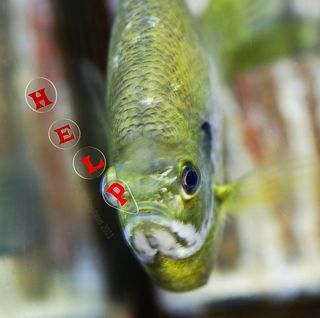
Everyone chuckles this away at first, thinking he's just encountering the reality of eating what you've killed. They think he'll change his mind once he takes a bite of that sweet flesh.
But his grandmother is looking at him in her careful way. She puts her hand on his back. "What do you want to do with him, baby?"
Ian says, "I want to take him home."
It dawns on me, finally, where he got the idea of fishing. Every year at the local State Fair, there is a display by the Fish and Wildlife Organization, a giant freshwater aquarium filled with big river trout swimming in greenish water for all to see. Ian loves it, the coppery, flashing fish, their long feathery tails.
There in the cooler is a shimmery blue fish with ruffling fins. "You wanted a pet," I say. "You thought you would get to keep him?"
Ian, blinking hard, nods.
Arranged around us are the old women, who love to catch fish and eat them. And men who've fed their families on the fish they caught, the animals they hunted. They are not happy with boys who cry, and for good reason. In their old world, it served them to make men tough and stoic.
But there is Lurelean, who gently shakes her head at the old man. "He's as tender-hearted as his daddy," she says, and that daddy steps up.
"We can't take him home, son," he says. "But we can let him go."
Someone protests. "That's a good supper there!"
"Leave the boy alone," Lurelean says, enfolding her gnarled hand around Ian's. His daddy carries the cooler, and together, the three of them tip the fish into the water, where it dives into the depths and swims away, traumatized but free to live another day.
Finally, we are driving back to St. Louis in the twilight. The children are exhausted, and I sit in the back seat with them, one on either side. Lurelean sits in the front seat with her own boy, who used to take two buses on a Saturday afternoon to go to shop for her hearing aid battery. A boy maybe a bit too sensitive for his environment, who grew up and became a man who could help a boy tip a living fish back in the water. They're talking quietly, peacefully, and I am enfolded in the tenderness and coolness.
We're passing little towns and bushes and wide fields of grass. Where, suddenly I see stars in the grass. "Stop the car!" I cry "What is that?
My husband pulls over. "What is it?"
"Are those fireflies?"
Lurelean laughs gently. "Isn't that a wonder. Child, you've never seen fireflies?
 The boys and I stare astonished wonder, shaking our heads. They don't live in Colorado. My
The boys and I stare astonished wonder, shaking our heads. They don't live in Colorado. My
husband puts his arm around his mother, touches the back of his sons, touches my head. We stand at the edge of the road, watching light dance in the twilight, humidity enveloping us like arms, the quiet of evening like acceptance, sparks of belonging dancing in the grass.
And I think of the blue gill, back there in the night-dark pond, swimming free.
------
(As I remembered this, it was no surprise to me that my child is now a vegan.)
Have you ever experienced being the outsider somewhere? What do others take for granted that you find astonishing?
July 6, 2011
Christmas in July
It's that time of year again. It's Christmas in July. At least for some people.
You know what I'm talking about. Your neighborhood has a family like this. The one house that leaves its Christmas lights up all year long. The family who doesn't quite fit in.
Their house doesn't look that different. The lawn is a little shaggy. The porch is one coat of paint behind the rest of the block. But look at that porch again.
That's how they give themselves away. They leave up their Christmas lights. In July.
It doesn't matter if they live in a rich neighborhood or a poor one, the standards are the same. Once, driving through a fancy suburb, a gentleman pointed to a sprawling home and said, "All that money and look how they keep up that house."
I didn't know why he sounded so disgusted. The place looked fine to me. Then I saw the tell-tale sign. It was Christmas in July. They'd left their lights up.
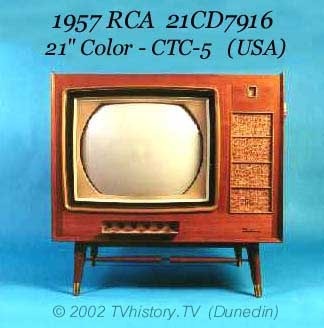 When I was growing up, we lived on a street full of up-and-comers, future executives and plant supervisors. One family had just bought a pink Edsel, which we all admired. The house across the street even had a color television. The whole block would go there to watch Dinah Shore. She had green hair.
When I was growing up, we lived on a street full of up-and-comers, future executives and plant supervisors. One family had just bought a pink Edsel, which we all admired. The house across the street even had a color television. The whole block would go there to watch Dinah Shore. She had green hair.
Then there was Bud's house. Bud's yard didn't look that bad. After all, he paid me 25 cents a bucket to dig out the weeds. And he didn't squash the weeds down in the bucket like other people did.
Bud was really old – about 50. He had bluish tattoos on sagging biceps, a tremendous beer gut and a long suffering wife named Bernice. For years, I thought her first name was Poor, because everyone called her Poor Bernice.
Bud liked to get drunk on Saturday night. He'd pour himself a beer. Then he'd pour a bowl of beer for his dog. The two of them would agree that life was sad and the Cardinals were sadder. About midnight, they'd both start howling. Then they'd fall asleep.
Bud had a girlie calendar on the kitchen door and a fascinating set of salt and pepper shakers – a reclining Daisy Mae. Her bosom was marked with a giant S and P. Unfortunately, I didn't get to see much of these artworks. Whenever I walked into the house, Bernice would slam the kitchen door shut and throw the toaster cover over the shakers.
The neighbors thought Bud was degenerate. When everyone gathered to watch the green Dinah Shore, they talked about him. The calendar was bad enough. And how could Bernice let those disgusting salt and pepper shakers in the house?
Shore, they talked about him. The calendar was bad enough. And how could Bernice let those disgusting salt and pepper shakers in the house?
But that wasn't the worst. Bud left his Christmas lights up all year round. Even in July.
He turned the lights on at Christmastime, just like everyone else. For eight weeks, the block was content. Bud fit in.
But Bud never took down the lights in the post-Christmas sleet storm. "Why should I put them up in November if I'm just going to take them down in January?" he said.
I'd never heard a grownup use that excuse before. It was the same argument I used for not making my bed: "Why do I have to make the bed in the morning, if I'm just going to get back into it at night?"
Bud and his beer-drinking dog are long gone. But he remains a shining light.
This is for you, Bud. Happy July.

